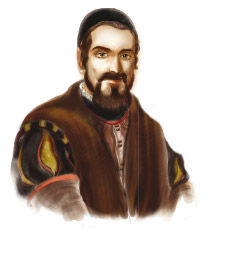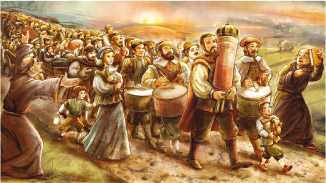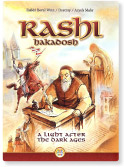DON ISAAC ABARBANEL

A MAN OF TWO WORLDS.
TORAH SCHOLAR.
FINANCIAL ADVISOR TO KINGS.
LEADER OF SPANISH JEWRY AT THE TIME OF THE EXPULSION AND THE INQUISITION.
Born in Lisbon Portugal, in 1437, the Abarbanel was a direct descendent of King David. His father, Judah, a pious Jew, was treasurer to one of the royal princes of Portugal. Raised as a son of Jewish nobility he was educated in both Torah and secular studies becoming skilled not only in the world of finance, but also in Talmud and Tanach – especially the writings of the Prophets.
Rising to prominence, he became an advisor to the King of Portugal, Don Alfonso V – and his cousin, the Duke of Braganza. At that time the Jews enjoyed unprecedented freedom and prosperity in Portugal – but when King Alfonso died – and Don Joao II was crowned monarch, things changed, especially for the Jews.
Don Joao had the Duke of Braganza arrested and executed. At the same time he issued a warrant for the Abarbanel’s arrest. Pre-warned this would happen, the Abarbanel fled to Spain.
Believing his misfortune was due to the “displeasure of Heaven” he settled in Toledo and dedicated his time to studying Torah and writing commentaries on the earlier Prophets. However his skills as a financial statesman soon became known to the royal court of Spain and he was appointed financial advisor to King Ferdinand and Queen Isabella. For eight years, from 1484 to 1492, their finances flourished and he remained their trusted and devoted servant.
But once again, as it had happened in Portugal, the dark shadow of prejudice and oppression fell over the Jews. The fanatic, anti-Jewish, Catholic priest Torquemada convinced the King and Queen that Spain should rid itself of the Jews.
Despite his personal financial assistance in helping the King’s army defeat the Muslims in Granada, which returned all of Spain to Christian rule, the Abarbanel was unable to convince the king to stop the persecution of his fellow Jews. Many were forced, or felt compelled, to convert to Catholicism. Of these, many who practiced their Judaism in secret, and were found out, faced the Inquisition, torture and death.
In March 1492 King Ferdinand, under pressure from Torquemada, issued a decree of expulsion against the Jews. The Abarbanel again appealed to the King and Queen and even offered the royal court 300,000 ducats of silver – but to no avail.
The King, fearful of losing his personal service, offered the Abarbanel and his family safe protection to remain in Spain – without having to convert. Proudly declaring his loyalty to God and the Jewish people, the Abarbanel refused the offer.
On August 2nd 1492, on Tish B’Av, two days before Christopher Columbus set sail on his voyage of discovery, the Abarbanel carrying a Torah scroll led 300,000 of his fellow Jews, their heads raised high – out of Spain.

Settling first in Naples, Italy, he again rose in position to advise the Neapolitan King. Seven years later he moved to Venice, where other than negotiating a spice trade agreement between Italy and Portugal, he dedicated the rest of his life to studying Torah and writing commentaries on Tanach – including The Prophets, The Book of Daniel, The Haggadah, Ethics of the Fathers and Rambam’s Guide to the Perplexed.
In his last work, Answer to Saul, he expressed regret that he had spent too much time servicing mortal kings – and not enough time serving “The True King”.
Acknowledged as a spiritual giant, and a leader of his people, he died in Venice in 1508.






